Daily Vocabulary Words: List of Daily Used Words in Leading International Newspapers
Hi there. Welcome to this special section @ Wordpandit.
Our endeavour here is very simple: to highlight important daily vocabulary words, which you would come across in leading newspapers in the country. We have included the following newspapers in our selection:
• The New York Times
• The Washington Post
• Scientific American
• BBC
• The Guardian
• Psychology Today
• Wall Street Journal
• The Economist
We are putting in extensive work for developing your vocabulary. All you have got to do is be regular with this section and check out this post on a daily basis. This is your repository of words that are commonly used and essentially, we are posting a list of daily used words. Hence, this has significant practical application as it teaches you words that are used commonly in leading publications mentioned above.
Visit the website daily to learn words from leading international newspapers.
WORD-1: Forthrightly
CONTEXT: Mr. Biden’s address performed a crucial civic service not only by channeling the public’s revulsion at a flagrant narcissist who won’t take no for an answer but also by forthrightly stating just what could happen to the United States if that narcissist wins again.
SOURCE: New York Times
EXPLANATORY PARAGRAPH: Imagine someone speaking very clearly and honestly, without hiding anything. That’s being forthright. Forthrightly means saying or doing something in a direct and honest way.
MEANING: In a direct and outspoken manner (adverb).
PRONUNCIATION: FORTH-ryt-lee
SYNONYMS: Directly, Honestly, Candidly, Bluntly, Straightforwardly
USAGE EXAMPLES:
1. He spoke forthrightly about the problems facing the company.
2. She addressed the issue forthrightly.
3. The teacher forthrightly explained the consequences.
4. He forthrightly admitted his mistake.
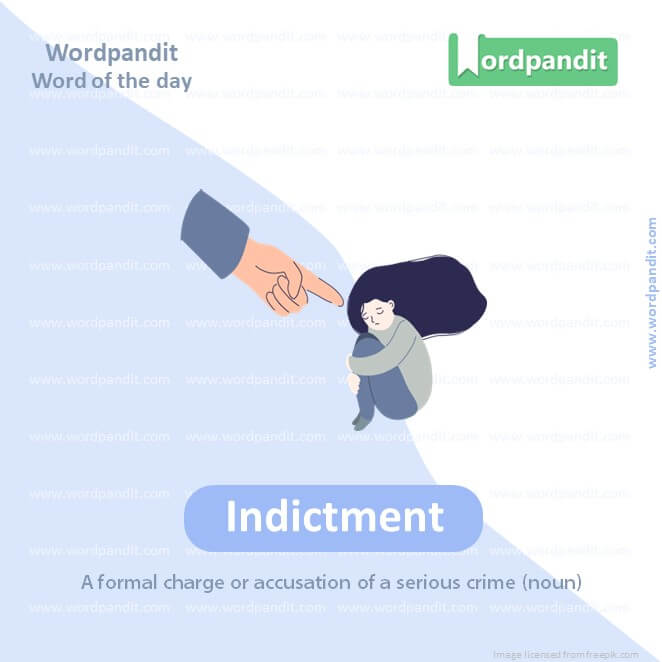
WORD-2: Indictment
CONTEXT: The impeachment clause of the Constitution provides that “the Party convicted shall nevertheless be liable and subject to Indictment, Trial, Judgment and Punishment, according to Law.”
SOURCE: Washington Post
EXPLANATORY PARAGRAPH: Imagine someone being officially accused of doing something wrong, like breaking a rule in school. That’s an indictment. It means a formal charge or accusation of a serious crime.
MEANING: A formal charge or accusation of a serious crime (noun).
PRONUNCIATION: in-DYT-ment
SYNONYMS: Accusation, Charge, Allegation, Arraignment, Prosecution
USAGE EXAMPLES:
1. The indictment charged him with fraud.
2. The grand jury returned an indictment against the suspect.
3. Her speech was an indictment of the government’s policies.
4. The indictment led to a high-profile trial.
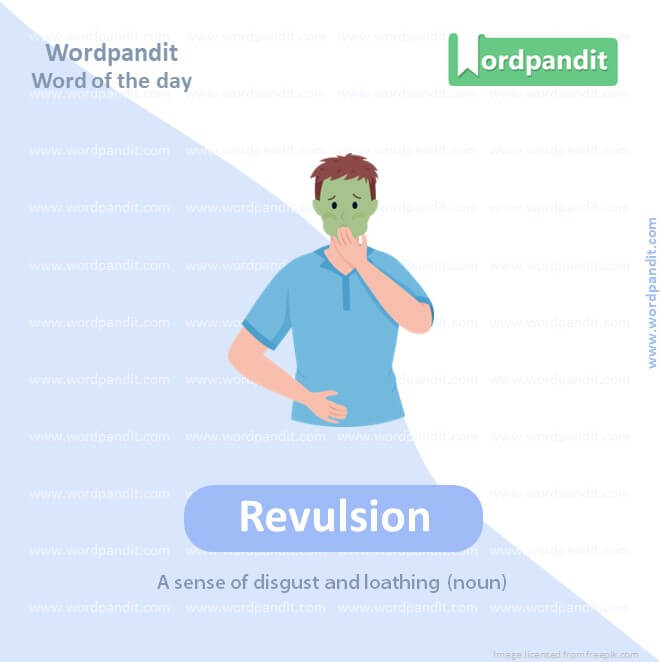
WORD-3: Revulsion
CONTEXT: Mr. Biden’s address performed a crucial civic service not only by channeling the public’s revulsion at a flagrant narcissist who won’t take no for an answer but also by forthrightly stating just what could happen to the United States if that narcissist wins again.
SOURCE: New York Times
EXPLANATORY PARAGRAPH: Imagine feeling really grossed out by something, like seeing a big spider. That feeling is revulsion. It means a strong feeling of disgust or dislike.
MEANING: A sense of disgust and loathing (noun).
PRONUNCIATION: ree-VUL-shun
SYNONYMS: Disgust, Repulsion, Abhorrence, Loathing, Nausea
USAGE EXAMPLES:
1. He felt a sense of revulsion at the sight.
2. The idea of eating insects filled her with revulsion.
3. His actions caused revulsion among the public.
4. She turned away in revulsion.
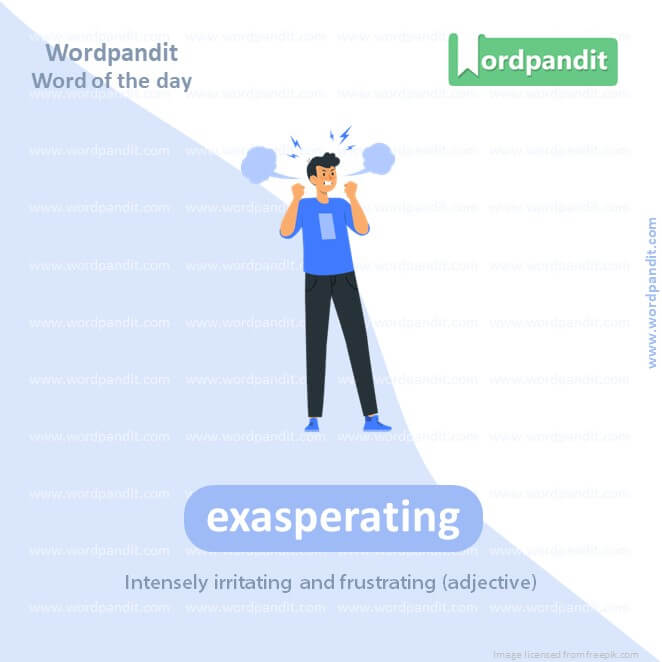
WORD-4: Exasperating
CONTEXT: the exasperating reality along with a majority of the country, struggles to cope with as we enter an election year unlike any in American history.
SOURCE: New York Times
EXPLANATORY PARAGRAPH: Think of a time when you felt really frustrated or annoyed, like if a video game was too hard. That’s exasperating. It means something that makes you feel annoyed or irritated.
MEANING: Intensely irritating and frustrating (adjective).
PRONUNCIATION: ig-ZAS-puh-ray-ting
SYNONYMS: Irritating, Annoying, Vexing, Infuriating, Aggravating
USAGE EXAMPLES:
1. The delay in the schedule was exasperating.
2. He found her constant questions exasperating.
3. The exasperating traffic jam made him late.
4. Dealing with the broken printer was exasperating.
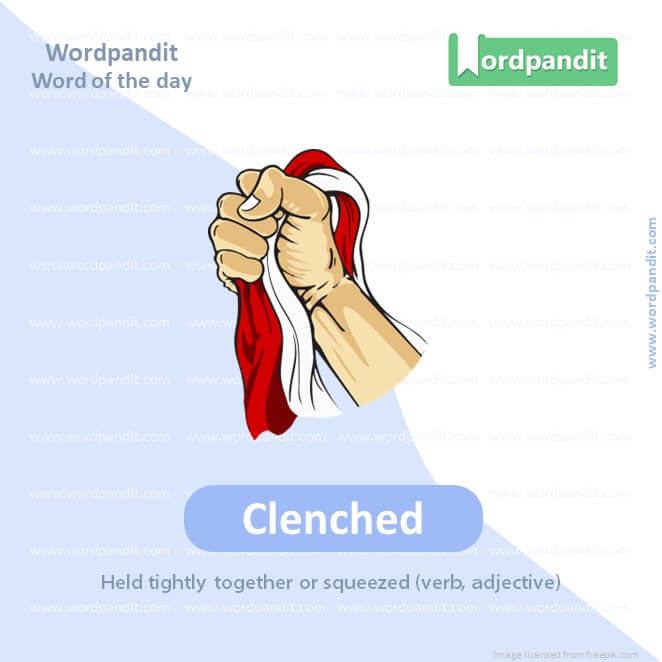
WORD-5: Clenched
CONTEXT: it was this brief, unfinished aside — off-script, sandwiched around an extended silence during which the president clenched his fists in an effort to resist uttering the curse behind his teeth.
SOURCE: New York Times
EXPLANATORY PARAGRAPH: Imagine squeezing your hand into a tight fist because you’re angry or determined. That’s clenching. Clenched means tightly closed or squeezed together.
MEANING: Held tightly together or squeezed (verb, adjective).
PRONUNCIATION: KLENCHT
SYNONYMS: Gripped, Grasped, Tightened, Compressed, Constricted
USAGE EXAMPLES:
1. She clenched her fist in anger.
2. He clenched his teeth in frustration.
3. His hand was clenched around the rope.
4. She clenched the ticket in her hand.
WORD-6: Fragility
CONTEXT: President Biden offered many eloquent turns of phrase on the importance and the fragility of democracy in his well-crafted campaign kickoff speech on Friday near Valley Forge, Pa.
SOURCE: New York Times
EXPLANATORY PARAGRAPH: Think about something like a thin glass that can break easily. That’s fragility. It means being easily broken or damaged.
MEANING: The quality of being easily broken or damaged (noun).
PRONUNCIATION: fruh-JIL-uh-tee
SYNONYMS: Brittleness, Delicacy, Vulnerability, Weakness, Frailty
USAGE EXAMPLES:
1. The fragility of the ancient artifact required careful handling.
2. The economic fragility of the country was a concern.
3. Her emotional fragility was evident after the loss.
4. The fragility of the ecosystem must be protected.
WORD-7: Indefensible
CONTEXT: Whatever the wisdom of Mayorkas’s policy decisions, the claim that he should be impeached is indefensible as a matter of constitutional law.
SOURCE: Washington Post
EXPLANATORY PARAGRAPH: Imagine doing something wrong that you can’t find a good reason to explain. That’s indefensible. It means something that is so bad or wrong that it cannot be defended or justified.
MEANING: Not justifiable by argument (adjective).
PRONUNCIATION: in-di-FEN-suh-bul
SYNONYMS: Unjustifiable, Inexcusable, Unpardonable, Unwarrantable, Unreasonable
USAGE EXAMPLES:
1. His actions were completely indefensible.
2. The decision was indefensible from a moral standpoint.
3. The lawyer admitted the case was indefensible.
4. The environmental damage was indefensible.
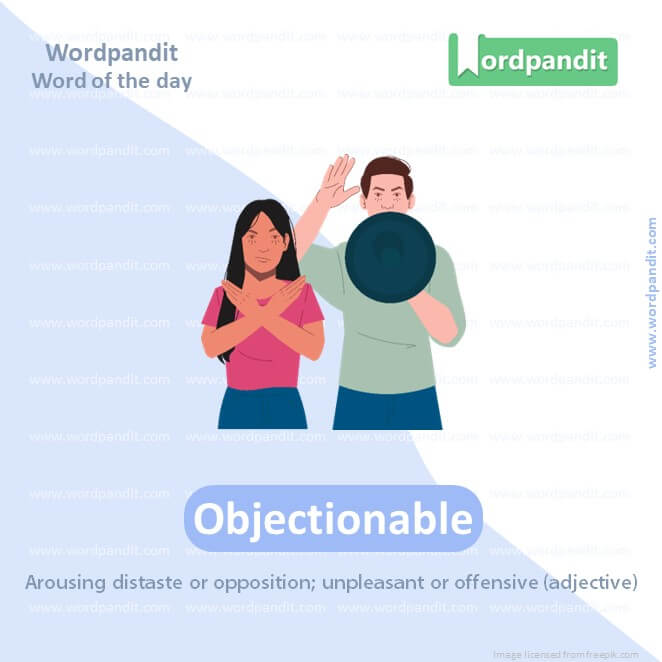
WORD-8: Objectionable
CONTEXT: No official who maintained the president’s support has ever been impeached for carrying out policy in ways the House found objectionable.
SOURCE: Washington Post
EXPLANATORY PARAGRAPH: Think about something that you really don’t like or think is wrong, like being mean to animals. That’s objectionable. It means something that causes disapproval or opposition.
MEANING: Arousing distaste or opposition; unpleasant or offensive (adjective).
PRONUNCIATION: uhb-JEK-shuh-nuh-bul
SYNONYMS: Offensive, Unacceptable, Disagreeable, Repugnant, Unpleasant
USAGE EXAMPLES:
1. Some viewers found the content objectionable.
2. His behavior was considered objectionable.
3. The proposal faced objectionable responses.
4. The book was banned for its objectionable themes.
WORD-9: Egregious
CONTEXT: The framers rejected that vision. For impeachments of “the President, Vice President and all civil Officers of the United States,” they instead required proof of egregious malfeasance:
SOURCE: Washington Post
EXPLANATORY PARAGRAPH: Imagine someone making a really big mistake that everyone notices. That’s egregious. It means something is very bad and shocking.
MEANING: Outstandingly bad; shocking (adjective).
PRONUNCIATION: ih-GREE-jus
SYNONYMS: Shocking, Appalling, Horrific, Outrageous, Flagrant
USAGE EXAMPLES:
1. His conduct was egregious.
2. The company made an egregious error.
3. The report pointed out the egregious abuses of power.
4. Her negligence was egregious.
WORD-10: Illuminating
CONTEXT: The rule that we do not impeach over policy disagreements has had its strongest expression in disputes over immigration enforcement. There are two illuminating precedents.
SOURCE: Washington Post
EXPLANATORY PARAGRAPH: Think about turning on a light in a dark room and suddenly you can see everything clearly. That’s like illuminating. It means giving light to something or explaining something clearly.
MEANING: Providing light or clarifying information (adjective, verb).
PRONUNCIATION: ih-LOO-muh-nay-ting
SYNONYMS: Enlightening, Clarifying, Informative, Revealing, Educational
USAGE EXAMPLES:
1. The lecture was illuminating on the subject.
2. The book provides an illuminating insight into her life.
3. His comments were particularly illuminating.
4. The investigation had an illuminating effect on the case.
Vocabulary Daily
Language learning is a beautiful yet complex dance, where ‘vocabulary daily’ connote the integral beats. These everyday words form the essence of most of our conversations and are the cornerstone of effective communication. However, a methodical approach is required to efficiently learn ‘vocabulary daily’.
One key approach to learning ‘vocabulary daily’ is consistency. Engaging with a few words every day consistently fosters better understanding and recall than sporadic cramming sessions.
Interactive tools can add a touch of excitement and ease to mastering ‘vocabulary daily’. Flashcards, word of the day calendars, language learning apps can make the learning experience fun and fruitful. These tools not only introduce new words but often provide a context of use, aiding your understanding.
Making ‘vocabulary daily’ a part of your daily life is a surefire success strategy. Incorporating these words into day-to-day conversations, writing, or social media interactions greatly enhances retention and usage. It also allows you to witness firsthand the impact of a rich vocabulary on the clarity of expression.
To effectively grasp ‘vocabulary daily’, always keep a learner’s curiosity. Explore books, news articles, music, and podcasts in the respective language. This exposure helps in absorbing the words in a real-world context, thus building a robust bond with ‘vocabulary daily’.
In conclusion, understanding ‘vocabulary daily’ is an ongoing process that necessitates consistency, interactive learning, practical application, and a learner’s curiosity. By following this comprehensive approach, the task of mastering ‘vocabulary daily’ becomes less of a chore and more of an enriching journey that can lead to eloquent and effective communication. So, step into the exciting world of ‘vocabulary daily’ and let it colour your language learning adventure with shades of clarity, confidence, and joy.











